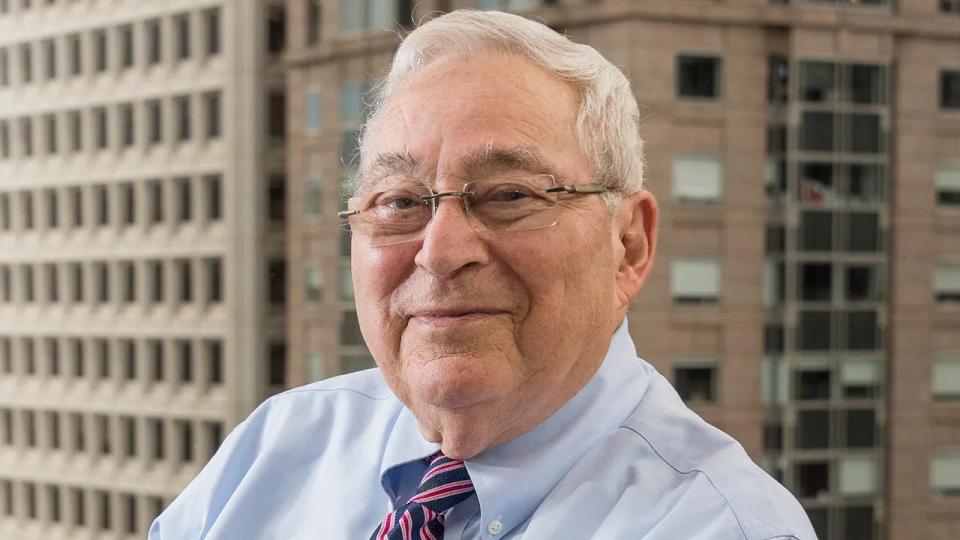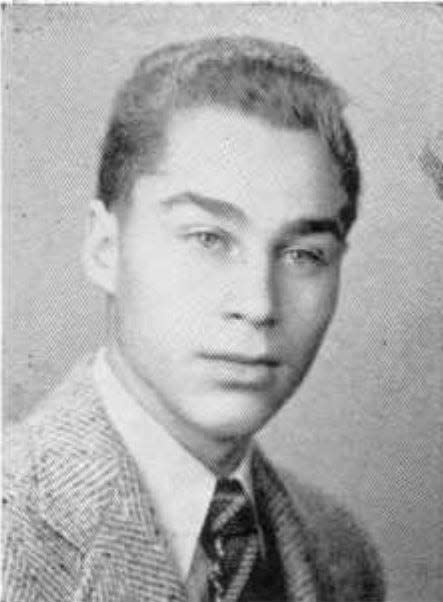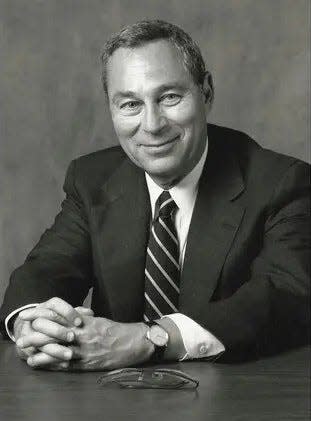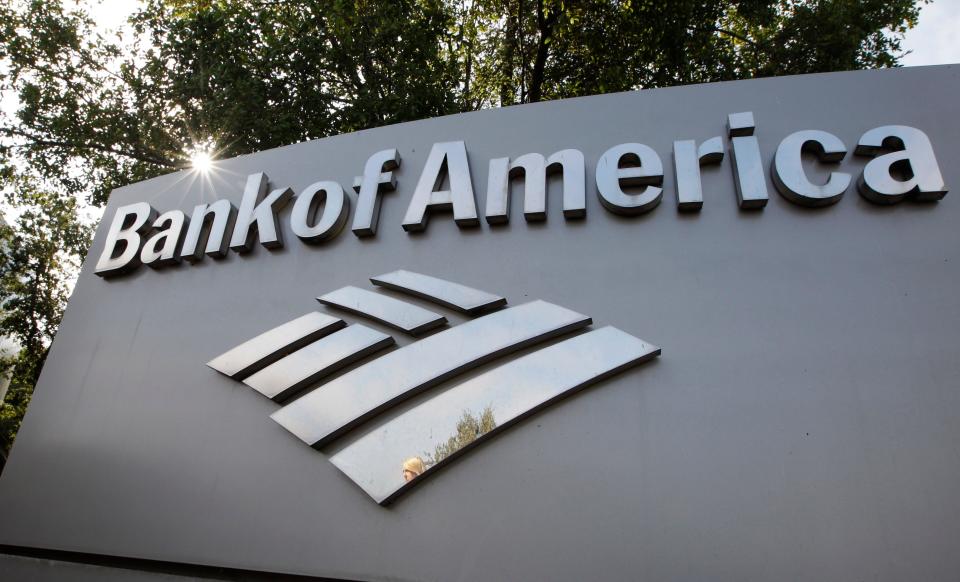Richard Rosenberg rose from Fall River's working class to the height of financial success
- Oops!Something went wrong.Please try again later.
Richard Rosenberg was back in Fall River, had flown in from his home in California. He had spent years building a life across the country, and had returned with his family for a quick visit and an event. And Fall River is a city of 90,000 people where you’re somehow always running into people you know.
His younger son Peter said while Richard was out getting some groceries, Richard saw an old friend from his days growing up in Fall River in the late 1940s. His old buddy hadn’t seen him in decades and asked Richard what he'd been up to.

Richard Rosenberg was at the time, a celebrity in the business world — the man who essentially invented bank marketing, who created an iconic campaign for Wells Fargo and eventually became that company’s vice chairman, who helped launch the MasterCard, who became the CEO of ailing Bank of America and reversed its fortunes to create a financial powerhouse. He had risen from Fall River to become one of the most powerful financial executives in the country, and a generous philanthropist. His old friend didn’t seem to know any of this.
“And my dad just said, ‘Oh nothing much, pretty much the same,’” Peter said.
“He didn’t boast about his success at all.”
Saving history: From churches to mills, these 13 places in Fall River are at risk of losing historic value
Richard Rosenberg: From rags to riches
Rosenberg died on March 3 at the age of 92, leaving behind his wife, Barbara, sons Michael and Peter, and a legacy of financial and personal success. But he started out in much more humble circumstances.

He was born in 1930 to Charles and Betty Rosenberg. A city directory at the time has the family living on President Avenue near Chestnut Street. During the Great Depression, the family struggled financially and a series of retail shops Charles started failed. Throughout World War II, with their house taken and no work in Fall River, Rosenberg’s father left to work in the shipyards of New York City while Betty and Richard lived with her parents.
“Neither of his parents were terribly well-educated. And when his father lost the job where he had been doing pretty well, psychologically he didn’t recover from that,” said E. Susan Garsh, Rosenberg’s cousin and a notable former Superior Court judge.
Bernard Taradash grew up with Rosenberg in the city’s small Jewish community. “We went to the temple together,” Taradash said. “The Jewish families knew each other. There were always some Jewish people who were involved in the affairs of the city.”
But Taradash said while many were doctors, were connected to city politics or had other prominent careers, Rosenberg’s family wasn’t rich or connected. By 1948, the year Rosenberg graduated from Durfee High, the family lived in a small home on Farnham Street, his father and mother both working as salesmen in clothing stores. “Don’t let me overstate it,” Rosenberg said in an oral history compiled by the University of California Berkeley. “You never missed a meal, but in many respects, you were always feeling as a second-class citizen in that community in which we lived.”
Paying for a tourism study: Fall River mayor grants $670k in ARPA funds; some wonder if it will be money well spent
Rosenberg's careers, from the Navy to the heights of financial success
While working his way through college at Suffolk University, Rosenberg was influenced to join the Navy, serving through the 1950s — a move that changed his life. He went to Officer Candidate School in Newport, R.I., and saw action in Korea and Vietnam; the latter, years before the U.S. escalation. The Navy changed him as a man. When given the chance to be the ranking officer on deck of a ship underway, he felt the responsibility of having people’s lives in his hands.
“He thrived when he got to the Navy, which was a true meritocracy,” said oldest son Michael Rosenberg, “and really learned his leadership skills there.”

As a Navy officer working for an admiral in New York City, he was set up on a date with Barbara Cohen, a Fall River girl two years younger who he had once taken to the junior prom, and who had made her way to the city, too. They had a disastrous first date that they’d spend the next 66 years laughing about together as husband and wife.
Rosenberg moved to San Francisco in 1959 and over the next several decades began a wildly successful career in public relations in the banking industry; during his time at Wells Fargo, he recalled the bank’s early days transporting gold and mail to the American west by stagecoach, and built that symbol into one the best-known corporate icons. His success led to positions in banking’s financial side, inventing the concept of “bundling” where a bank would offer multiple services to a customer, helping launch MasterCard, and, in 1987, taking a position at Bank of America that saw him turn around a $1.8 billion loss to a $1.1 billion profit.
He led Bank of America as CEO from 1990 to 1996, leaving it with $225 billion in assets — twice as big as he’d found it, making it the second-largest bank in the nation.
'He felt very blessed and very lucky'

Rosenberg’s business accomplishments could fill hundreds of pages, but he was equally as proud of his second career as a philanthropist. Having risen from the working class to the pinnacle of financial success, he spent his later years giving things away.
“There was a long, long laundry list of causes that he was involved in," Michael Rosenberg said. “A lot of it was based on health care and education.”
He served on far too many boards to name, and gave to too many charities to count. He led a $900 million capital campaign to build the University of California San Francisco’s medical center at Mission Bay; founded the Rosenberg Institute of Global Finance at Brandeis University; funded the Barbara and Richard Rosenberg Family Center at the San Francisco Campus for Jewish Living; was named to the Horatio Alger Association of Distinguished Americans, alongside Buzz Aldrin, Maya Angelou, Thurgood Marshall, Colin Powell, Chuck Yeager and Oprah Winfrey. He was even named a distinguished Durfee High alumnus in 1987.
But among the most cherished possessions he gave away was his time. Garsh said Rosenberg was a mentor to many people, including women in an age when they were shut out of the executive world. Garsh, 17 years younger than Rosenberg, recalled a summer she spent with him in California when she was 15, and how generous he was with advice and encouragement.
“We would have these long discussions about politics and all sorts of things,” Garsh said. “He treated me in a way that was great. … That summer was very material to my career and Dick believing in me and supporting me at all times.”
Rosenberg’s sons say he was a tough but caring and supportive father, instilling in them deep faith in Judaism and the courage to make their own decisions. As a grandfather, Peter Rosenberg said, he again shared his time and turned it into a way to pass on knowledge — he orchestrated treasure hunts for them every Fourth of July. “They purchased a home up in the Napa Valley," Peter said. “He actually put a lot of thought into it, with a map, and how to navigate and use clues.
“He took on the role of a grandfather and a father … it was as important to him as his CEO title at Bank of America.”
Peter recalled helping his elderly father pay his bills in recent years, helping write checks to Temple Beth El in Fall River – the synagogue in the city where he'd grown up, 3,000 miles away.
“He felt very blessed and very lucky,” Peter said. “He just felt he won the lottery effectively in where he ended up in his life. He never forgot that.”
Dan Medeiros can be reached at dmedeiros@heraldnews.com. Support local journalism by purchasing a digital or print subscription to The Herald News today.
This article originally appeared on The Herald News: Richard Rosenberg, Fall River native, dies at 92; Bank of America CEO

